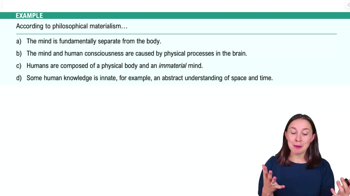Table of contents
- 1. Introduction to Psychology1h 43m
- 2. Psychology Research2h 20m
- 3. Biological Psychology2h 41m
- 4. Sensation and Perception28m
- 5. Consciousness and Sleep32m
- 6. Learning41m
- 7. Memory34m
- 8. Cognition37m
- 9. Emotion and Motivation35m
- 10. Developmental Psychology33m
- 11. Personality48m
- 12. Social Psychology41m
- 13. Stress and Health41m
- 14. Psychological Disorders44m
- 15. Treatment47m
1. Introduction to Psychology
What is Psychology?
Struggling with Psychology?
Join thousands of students who trust us to help them ace their exams!Watch the first videoMultiple Choice
True or False (if false, choose the answer that best corrects the statement); The famous philosopher John Locke believed that humans are born with extensive, species-specific knowledge.
A
True.
B
False; Locke believed that humans are born with some innate knowledge.
C
False; Locke believed in philosophical dualism (the idea that the mind and body are separate entities).
D
False; Locke believed that humans are born tabula rasa, as “blank slates” with no innate knowledge.

 1:53m
1:53mWatch next
Master Intro to Psychology with a bite sized video explanation from Hannah Gordils
Start learningRelated Videos
Related Practice
































